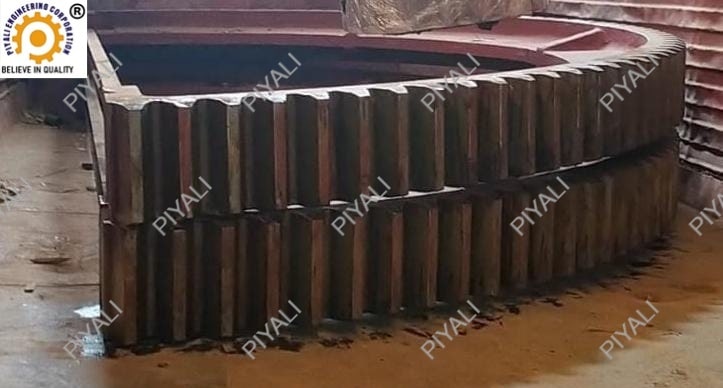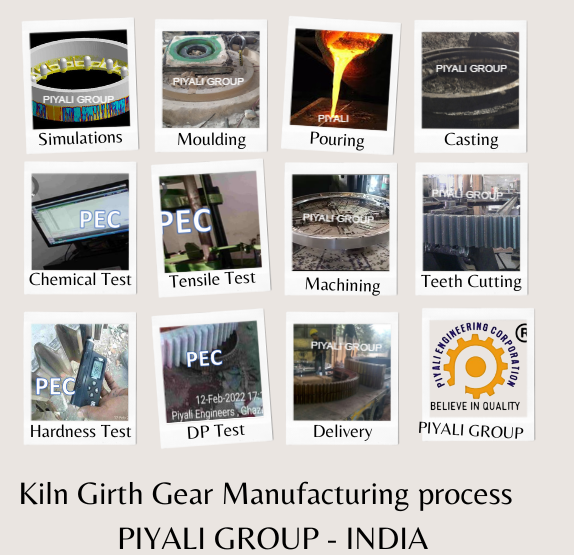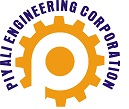ROTARY KILN GIRTH GEAR MANUFACTURER|PIYALI ENGINEERING CORPORATION
We Piyali Engineering Corporation Offers a wide range of kiln and cooler machinery spare parts and equipment like kiln and cooler Girth Gear, Rotary Kiln tyre with shell, Pinion, KILN Tyre, Support roller, Thrust Roller, Plumber block, bearing housing, labyrinth rings (Bearing sleeves), Spring plates, End cover, End plate, Nut bolts and washery pins. The kiln girth gear is an important component in the rotary kiln system of a sponge iron plant. This component is attached to the kiln and rotates on rollers or bearings, enabling smooth rotation of the kiln.
Piyali Group has a team of experienced engineers and technicians to meet the specific needs of their customers. We, Piyali Engineering Corporation, manufacture and export products to the various states of India including Maharashtra, Karnataka, Andhra Pradesh, West Bengal, Odisha, Bihar, Jharkhand, Chhattisgarh, Gujrat, Tamil Nadu, Meghalaya, Tripura, Himachal Pradesh, Haryana, Telangana and others. The company has a modern manufacturing facility in Ghaziabad, Uttar Pradesh, India, which is equipped with the latest machinery and technology to produce high quality products. The company has a global presence and exports its products to other countries. Some international customers are located in Egypt, Sweden, Jordan, Srilnaka, Canada and the United States.

PRODUCT SPECIFICATIONS: ROTARY KILN GIRTH GEAR
In this product specification, the module is a millimeter-based measurement of the size of the gear teeth. The kiln’s capacity is the quantity of material they can handle in a single day. The diameter is a key factor that affects the size and power of the entire structure.
- MODULES – As per the client’s specifications
- CAPACITY – Rotary Kilns for Sponge Iron Steel Plant
- CERTIFICATION – ISO9001
- NO. OF TEETH – As per the client’s requirements
- MATERIAL GRADE – CAST STEEL IS 2708 Grade 2/3, IS 2644 Grade CS 700, GS34CrMo4
- DESIGN – AS PER CUSTOMER PROVIDED (POPURI / IPS / ITC / MEC / LURGI etc.)
ROTARY KILN GIRTH GEAR MANUFACTURING PROCESS:
With 30 years of experience, PIYALI GROUP is an expert in the manufacturing and processing of rotary kiln parts. The production of girth gear involves a number of steps from the raw material’s transformation to the finished product. The basic steps in processing kiln girth gears are as follows:

MANUFACTURING PROCESS FOR KILN GIRTH GEAR AS FOLLOWINGS :
- Casting Simulation: Casting simulations involve various parameters, such as material properties, mold design, pouring conditions, cooling rates, and solidification behavior. It typically requires specialized software and a detailed analysis to accurately simulate the casting process for a specific component like a rotary kiln girth gear.
- Casting: Casting is one of the manufacturing methods used for producing gears. It entails pouring molten metal into a mold in order to produce the desired shape and size of the gear. Sand casting is a preferred manufacturing process for girth gears. The procedure includes the use of a sand mold to shape the molten metal into the desired form. The sand mold is packing sand around a pattern that represents the finished gear shape.
- Blanking: Blanking process in which a flat piece of metal is first cut into the rough form of a gear using a cutting tool, usually a die or punch. In the process of making gears, the blanking process is important as it sets the groundwork for the succeeding processes, including heat treating, finishing, and shaping. There are various techniques to complete the blanking process, including hobbing, broaching, shaping, and milling.
- Heat Treatment: Heat treatment is the process that enhances the hardness, strength, and durability of girth gear as well as its resistance. Heat treatment is a process that involves subjecting a girth gear to high temperatures, which results in a structural change in the material, and then cooling it down in a controlled way to improve its mechanical properties. The various heat treatments include carburizing, quenching and tempering, normalizing, and annealing.
- Gear Machining: Rough machining is the initial step of girth gear machining. The roughing process eliminates the excess material to make the gear blank ready for finishing.The final stage of gear production is gear finishing.
- Gear Testing: Girth gear testing is an essential process in the maintenance and care of these equipment. Regular testing and inspection are necessary to guarantee the girth gear’s reliability and secure operation.
- Packaging and Delivery: A wooden box can be a good choice for packing heavy equipment for storage or transportation. To determine the proper size of the required wooden box, measure the girth gear first. Then choose a large, solid wooden box that can hold the equipment and leave the enough space for protection and security. After completing the whole gear manufacturing process, the product is finally delivers to the customer.
KEY FEATURES:
- A Rotary kiln girth gear is typically large in size, and it must be capable of handling heavy loads and high temperatures.
- High-quality cast steel for kiln girth gears ensure its durability and strength.
- The design of the tooth shape of the kiln girth gear ensures smooth and effective power transmission between the driving and driven components.
- Proper lubrication is necessary for kiln girth gear to ensure that it functions smoothly.
- Regular maintenance is necessary to detect wear or damage and prevent serious problems if they occur.
APPLICATIONS USED:
- Sponge Iron Plant
- Cement Plant
- Chemical Plant
- Carbon Plant
- Sugar and Paper Mills
- Fertilizer Plant
WHY CHOOSE PIYALI FOR ROTARY KILN SPARES?
- PIYALI GROUP is a manufacturer, supplier, and exporter of high-quality kiln girth gears.
- PIYALI GROUP offers excellent supply and export services that are beneficial for businesses seeking to purchase kiln spares from a reputable supplier.
- To produce high-quality girth gears with a high accuracy and precision, PIYALI GROUP employs more experienced workers and engineers.
- PIYALI GROUP conducts quality control procedures to ensure that the products meet or exceed industry standards.

